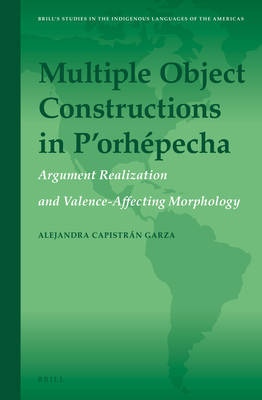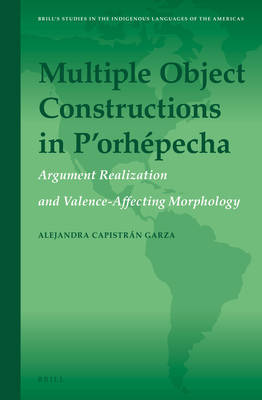
- Afhalen na 1 uur in een winkel met voorraad
- Gratis thuislevering in België vanaf € 30
- Ruim aanbod met 7 miljoen producten
- Afhalen na 1 uur in een winkel met voorraad
- Gratis thuislevering in België vanaf € 30
- Ruim aanbod met 7 miljoen producten
Zoeken
Multiple Object Constructions in P'Orhépecha
Argument Realization and Valence-Affecting Morphology
Alejandra Capistrán
€ 232,45
+ 464 punten
Omschrijving
In Multiple Object Constructions in P'orhépecha, Capistrán offers a detailed description of double and triple object clauses in P'orhépecha, a Mesoamerican isolate with a case system lacking an accusative-dative distinction. Regarding argument realization, Capistrán discusses alternating constructions and a construction split triggered by the person hierarchy. Valence-affecting operations--applicative, causative/instrumental and part-whole lexical suffixes--are examined, highlighting the person features of applicative suffixes and the complex part-whole morphology. Capistrán's analysis demonstrates that in P'orhépecha most object coding properties show a neutral pattern, while all behavioral properties present asymmetries that shape a secundative pattern or PO/SO alignment. Capistrán argues that the strong tendency in P'orhépecha to determine PO selection according to a thematic ranking helps explain the (un)grammaticality of tritransitive constructions.
Specificaties
Betrokkenen
- Auteur(s):
- Uitgeverij:
Inhoud
- Aantal bladzijden:
- 358
- Taal:
- Engels
- Reeks:
- Reeksnummer:
- nr. 9
Eigenschappen
- Productcode (EAN):
- 9789004288331
- Verschijningsdatum:
- 26/02/2015
- Uitvoering:
- Hardcover
- Formaat:
- Genaaid
- Afmetingen:
- 155 mm x 231 mm
- Gewicht:
- 317 g

Alleen bij Standaard Boekhandel
+ 464 punten op je klantenkaart van Standaard Boekhandel
Beoordelingen
We publiceren alleen reviews die voldoen aan de voorwaarden voor reviews. Bekijk onze voorwaarden voor reviews.








